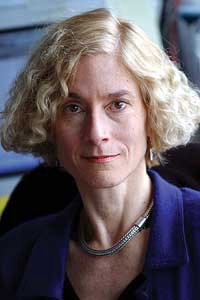Exchange or Justice?

Berkeley is a great place to find people who care about improving the quality of life for the least fortunate. Yesterday and the day before I had three meetings about that issue – all with wonderful, caring intellectuals. I can’t do justice to their concerns, which overlapped a lot, but it’s a privilege to witness them.
One was lunch with my dear friend Arlie Hochschild, who is preparing a paper to present in Europe about her ongoing research. She’s been writing a book about the commercialization of care-giving and we used to talk about it every week or two by phone. It seems that her argument has advanced since our last conversation. Nowadays the process that she’s describing has become more abstract and general. She sees the ongoing social change as reflecting the tendency of the market to take over some of the governance mechanisms that were formerly carried out by government itself. This exchange model does not sit well with her as a substitute for politics. Now she’s trying to analyze just what this “governance” is that is being taken over by the commercialization that she abhors. (Personally, I’ve never shared her horror of the market system, which I think has improved the quality of life for billions of people, enabling them to live longer and more comfortably – but I’m glad to join mentally in her project, not only out of personal affection, but also because I admire her quest for a freer and more just society.)
My second meeting was a book signing lecture given by Martha Nussbaum on Wednesday evening. (See her photo.) What a fabulously interesting, wise, beautiful, and kind human being! I’ve been influenced a lot by her books. I think I’ve read eight of them so far, and none of them are easy. The new work, Frontiers of Justice: Disability, Nationality, Species Membership, is her effort to advance beyond the theory of justice proposed by her late friend John Rawls and, indeed, the whole philosophical approach based on the notion of a social contract. Rawls’s views were superior to many preceding contract theories in his insistence that, contrary to utilitarianism, one criterion of justice is that a proposed arrangement must improve the condition of the worst off person(s) in the society. It is not enough to benefit the greatest number of people if that improvement is accomplished at the price of harming the disadvantaged. In a word, it’s not fair to progress on the backs of the poor.
However, as Nussbaum points out, the whole social contract model assumes that the participants forming the initial social compact should be roughly equal at the outset. In reality, there are several ways in which this condition does not apply. In her book she explores three such exceptions: the question of justice for the mentally impaired , for animals, and for whole impoverished nations. You can’t just suppose they enter into some kind of free contract with others, for the lack the capacity to do so fairly. How, she asks, can one determine what social arrangements are just when their welfare is at stake?
Her answer develops Rawls’s notion further, after agreeing with him that those who are worst off must benefit from the proposed contract. Her criterion, however, specifies the nature of such a benefit: it must favor the development of their capacities, enhancing their ability to choose freely for themselves. She wants to support the real flourishing of everyone, not accepting the minimal survival of some. And, like Arlie, she sees the whole exchange model as a limited conception of how to achieve goodness in society. She questions whether the pursuit of mutual private gain will, by itself, improve the overall flourishing of the whole community. Something like altruism is required – a larger sense of “we-ness.”
Finally, the third speaker on what I’m construing as the same topic was Jonah Levy, a Berkeley political science professor who came to the sociology department and discussed progressive approaches to economic liberalizationin Western Europe. His argument casts doubt on Arlie’s issue as a genuine reason for concern. It is not that he’s willing to turn everything over to the neo-liberal economists and let them privatize everything, surrendering to the power of the market. Yet he would claim to be a liberalizer himself – just one without the “neo” prefix. He claims that there are many different kinds of liberalism, some of which actually benefit the worst-off in society instead of increasing inequality. For example, taxes can be cut with good effect, so long as it is the taxes of the poor and not the rich that are cut. Levy explored a number of changes that would have all the beneficial effects that the neo-liberals adduce as justification for their policies, but which would benefit the disadvantaged more than the privileged. In the question and answer period, no one disputed his conclusions.
What did have to be addressed was not whether these were good ideas, but rather how they could be accomplished. Levy’s advice was straightforward. Don’t blame the supposedly inevitable economic pressures for these decisions. Alternatives are possible. The economy (or, in Arlie’s terms, the market) is not running everything, taking our options away from us. These decisions are the result of politics, politics, politics.
I find that a hopeful conclusion. We just have to get smarter about what to do – and then do it.



0 Comments:
Post a Comment
<< Home